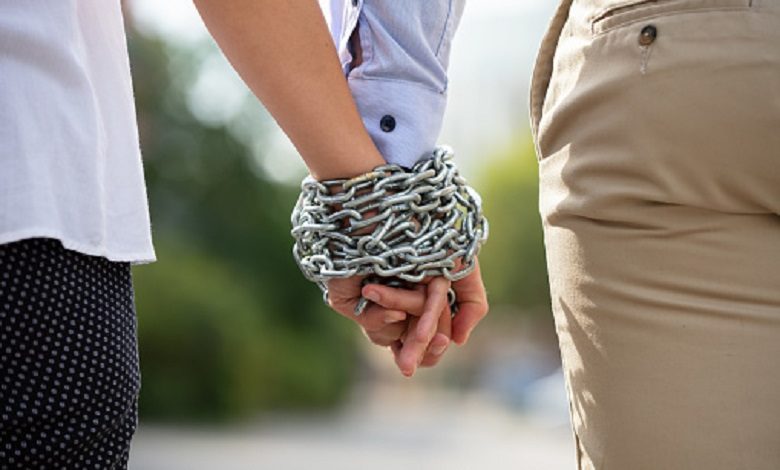What is a Codependent relationship? 10 signs that you are in one

Codependent relationships can be challenging to identify because they seem happy and calm, at least initially.
But this impression is deceiving since they have several unpleasant consequences.
What is a codependent relationship?
A simple definition of codependency is that one partner sacrifices more in a relationship than the other.
In doing so, one is dependent on the other and uses various forms of manipulation to gain love and approval or to feel worthy.
A codependent relationship occurs when each partner relinquishes responsibility.
Typically, one partner is the “host,” and the other is the “caregiver,” although these roles may vary depending on the problem. For example, one partner may be “caring” financially and “accepting” emotionally or s*xually.
In romantic relationships, codependency often manifests itself when one requires increased attention and psychological support. Usually, this is accompanied by illness and dependence, which makes him even more dependent.
A codependent union does not benefit anyone in a couple. People tend to converge because one or both are dysfunctional, and over time, the problems only worsen.
In healthy relationships, people are also dependent on each other for support and approval, but there is a balance between each other’s independence and mutual assistance.
Here are ten dangerous signs that you are in a codependent relationship, according to an expert
You sacrifice your interests for the sake of another
A codependent “giver,” as a rule, puts his needs and preferences in the last place and sometimes gets so confused that he no longer understands where his desires are and where the wishes of a partner are.
It is also one of the ways to get your partner’s approval and recognition. For example, one partner may watch a particular film genre just because his husband/wife likes it, although they may have completely different tastes.
You want to fix your partner
It may start like a fairy tale, but one of you may begin to exhibit unhealthy behavior over time.
Do you have to sacrifice everything to support your partner? Do you feel like you’ve lost yourself and need your partner’s approval to feel whole?
Healthy relationships arise when partners have mutual respect, trust and are honest with each other.
The “caregiver” in a codependent relationship often tries to fix a partner and has a whole list of things that he would like to improve in him.
Codependents try to please, help, or believe they can fix them. But when caring for the other forces you to completely forget about your needs, or your self-worth depends on the feeling of being needed by the other, you begin to walk the path of codependency.
You are always afraid that they will leave you
If childhood love seemed conditional to you, then you may still have the fear of losing your partner’s love in adulthood, which is why you begin to experience an overwhelming feeling of emptiness without another person.
Even when he leaves you for a short period, you feel anxious that he/she will never return. You can call or follow your partner to make sure they haven’t left.
You are losing your boundaries
In a codependent relationship, one always gives a lot more. He feels more responsible for the other, showing excessive concern. For example, a woman can only provide all the time, paying too much attention. These women may seem strong, but they don’t feel their boundaries.
Codependency people have often had very dramatic, sometimes turbulent relationships in the past. This is due to the inability to distinguish between your feelings and the feelings of a partner, family member, or friend, blurring boundaries, leading to confusion and anger.
In a healthy relationship, partners have clear boundaries. If one begins to sacrifice himself constantly, he falls into the trap of codependency.
You don’t have your own life
It is essential to both keep in touch and not forget about your own life in any relationship. You don’t have to become so addicted to losing yourself or the essence that makes you unique.
To maintain this balance at the beginning of the relationship, allow each other not to spend every day together, allowing missing each other.
For example, plan dates with your partner and meet with friends separately or on your own. Keeping your independence, you will be a more attractive, comprehensively developed personality, which means a good partner.
You need constant approval
If you often feel like you need approval or permission to do everyday things or can’t make a simple decision without this person, this may be the first sign of codependency.
Suppose you entered a relationship as a fairly confident person, but over time began to doubt yourself, your self-esteem and became less determined. In that case, you are most likely in an abusive, codependent relationship.
Please note that if your partner controls you, he requires you to be the primary decision-maker. It isn’t easy to mentally separate yourself from this mindset or relationship, but you need to focus more on your needs and desires
Your partner has unhealthy habits
One of the early signs of a codependent relationship is the other’s unhealthy behavior, such as regular alcohol abuse or overeating until nausea.
At the same time, the partner may also share unhealthy habits with him, although he does not like them or does it for some reason.
You are ready to do anything so as not to be left alone
Codependents feel a deep need to be with a person not out of love but not to be alone.
You may hate being alone, feeling anxious when alone, or simply not knowing what to do with yourself.
You may even feel like you don’t feel who you are without a partner. In people in codependent relationships, personality formation is impaired, interfering with their healthy development.
You have very low self-esteem
Typically, no one in a codependent relationship has normal self-esteem. One needs the approval of the other or at least feels the need to be helpful.
Another suffers from low self-esteem due to the need to be in a dependent position to meet material needs or get approval from that person.
The addicted person often tries to control the other because of the elementary feeling of insecurity that the partner might leave.
Constant stress
As you might expect, any of these factors can seriously affect a relationship. When you cannot communicate normally, do not feel your boundaries, problems involuntarily arise.
The “caregiver” feels stressed about getting it right, and the “addict” often feels insecure about being abandoned by his partner.
Both are afraid to be alone, but neither is happy. Even if there are no fights in a couple, since one partner is always trying to make the other content, both are stressed and tense.




